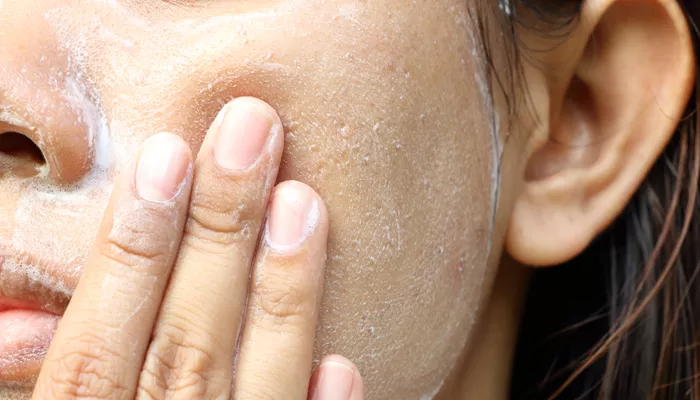Exfoliation is one of the most important steps in any skincare routine. It helps remove dead skin cells, unclog pores, and promote cell turnover, leaving your skin looking fresh and radiant. But what happens when you skip this crucial step? In this article, we’ll explore the consequences of not exfoliating your skin, why it matters, and how you can incorporate exfoliation into your routine for healthier, glowing skin.
Why Exfoliation Matters
Before diving into the effects of not exfoliating, it’s important to understand why exfoliation is so essential. Your skin naturally sheds dead cells every 30 days or so, but this process can slow down due to aging, environmental factors, or poor skincare habits. When dead skin cells accumulate on the surface, they can clog pores, dull your complexion, and even lead to breakouts. Exfoliation helps speed up this process, revealing smoother, brighter skin underneath.
There are two main types of exfoliation: physical and chemical. Physical exfoliation involves scrubbing the skin with tools or products containing small particles, while chemical exfoliation uses acids or enzymes to dissolve dead skin cells. Both methods are effective, but the choice depends on your skin type and concerns.
What Happens When You Don’t Exfoliate?
1. Dull and Lifeless Skin
When dead skin cells build up on the surface, they create a barrier that prevents light from reflecting off your skin. This makes your complexion look dull, tired, and uneven. Without exfoliation, your skin loses its natural glow, and even the best moisturizers or serums won’t penetrate effectively.
2. Clogged Pores and Breakouts
Dead skin cells, along with excess oil and dirt, can clog your pores. This creates the perfect environment for bacteria to thrive, leading to blackheads, whiteheads, and acne. If you’re prone to breakouts, skipping exfoliation can make the problem worse.
3. Uneven Skin Texture
Without regular exfoliation, your skin’s texture can become rough and uneven. You may notice dry patches, flakiness, or small bumps on your face. This uneven texture can make it harder for makeup to apply smoothly, resulting in a cakey or patchy appearance.
4. Premature Aging
Exfoliation promotes cell turnover, which is essential for maintaining youthful skin. When you don’t exfoliate, the buildup of dead skin cells can make fine lines and wrinkles more noticeable. Additionally, your skin’s ability to absorb anti-aging products is reduced, making it harder to combat signs of aging.
5. Hyperpigmentation and Dark Spots
Dead skin cells can trap melanin, the pigment responsible for skin color, leading to dark spots and uneven skin tone. Exfoliation helps fade these spots by encouraging the growth of new, healthy skin cells. Without it, hyperpigmentation can become more pronounced over time.
6. Poor Product Absorption
When your skin is covered in a layer of dead cells, skincare products like serums, moisturizers, and treatments can’t penetrate effectively. This means you’re not getting the full benefits of your skincare routine, no matter how expensive or high-quality your products are.
7. Increased Sensitivity
While it may seem counterintuitive, not exfoliating can actually make your skin more sensitive. Dead skin cells can trap dirt and bacteria, leading to irritation and inflammation. Over time, this can weaken your skin’s barrier, making it more susceptible to environmental damage.
How Often Should You Exfoliate?
The frequency of exfoliation depends on your skin type and the method you choose. Here’s a general guideline:
- Oily or Acne-Prone Skin: 3-4 times a week with a gentle chemical exfoliant (like salicylic acid).
- Dry or Sensitive Skin: 1-2 times a week with a mild physical or chemical exfoliant (like lactic acid).
- Combination Skin: 2-3 times a week, adjusting based on how your skin responds.
- Mature Skin: 2-3 times a week with a gentle chemical exfoliant (like glycolic acid) to boost cell turnover.
Always listen to your skin. If you notice redness, irritation, or excessive dryness, reduce the frequency or switch to a gentler product.
Tips for Safe and Effective Exfoliation
- Choose the Right Product: Select an exfoliant that suits your skin type. For sensitive skin, avoid harsh scrubs and opt for chemical exfoliants with lower concentrations of active ingredients.
- Don’t Overdo It: Over-exfoliating can damage your skin’s barrier, leading to irritation, redness, and increased sensitivity. Stick to the recommended frequency for your skin type.
- Follow with Moisturizer: After exfoliating, always apply a moisturizer to replenish hydration and protect your skin’s barrier.
- Use Sunscreen: Exfoliation can make your skin more sensitive to the sun. Apply a broad-spectrum SPF daily to prevent sun damage.
- Patch Test New Products: Before using a new exfoliant, do a patch test to ensure it doesn’t cause irritation or an allergic reaction.
The Benefits of Regular Exfoliation
When done correctly, exfoliation offers numerous benefits for your skin:
- Brighter Complexion: Removes dead skin cells to reveal a fresher, more radiant appearance.
- Smoother Texture: Evens out rough patches and bumps for a softer feel.
- Reduced Breakouts: Keeps pores clear and prevents acne-causing bacteria from thriving.
- Improved Product Absorption: Allows skincare products to penetrate deeper and work more effectively.
- Youthful Glow: Boosts cell turnover to reduce the appearance of fine lines and wrinkles.
Conclusion
Exfoliation is a non-negotiable step in any skincare routine. Without it, your skin can become dull, uneven, and prone to breakouts. By incorporating regular exfoliation into your regimen, you can maintain a healthy, glowing complexion and prevent common skin concerns. Remember to choose the right exfoliant for your skin type, avoid over-exfoliating, and always follow up with moisturizer and sunscreen. Your skin will thank you!
So, the next time you’re tempted to skip exfoliation, think about the benefits you’re missing out on. A little effort goes a long way in achieving the beautiful, radiant skin you deserve.
Related topic:
When Can I Exfoliate After Laser?
When Do I Exfoliate In My Skincare Routine?
Can I Exfoliate After Microdermabrasion?

